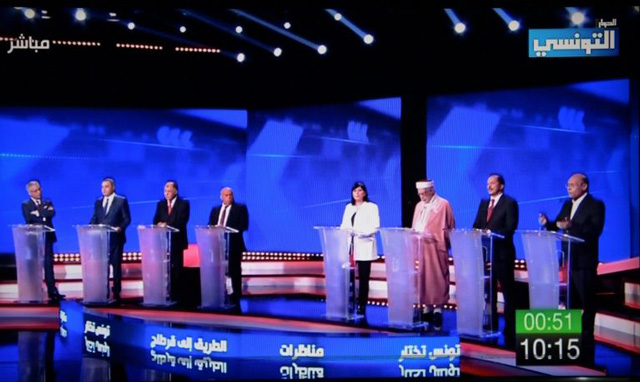
Tunis, Tunisia | AFP | Days before the first round of Tunisia’s presidential election, the fledgling democracy on Saturday began three nights of televised debates between the candidates, a rare event in the Arab world.
The showdown between the 26 hopefuls over three nights is seen as the highlight of the campaign and a turning point in Tunisian politics ahead of the vote a week from Sunday.
Called “The road to Carthage: Tunisia makes its choice”, the programme was broadcast on 11 TV channels, two of them public, and about 20 radio stations in the country which gave birth to the Arab Spring reform movement several years ago.
Tunisia has since been praised as a rare success story for democratic transition after the uprisings.
“We won’t be able to escape it,” said a smiling Belabbes Benkredda, founder of the Munathara Initiative which promotes open debate in the Arab world and helped organise the event.
The first hour-and-a-half debate on Saturday night involved eight of the candidates, including Abdelfattah Mourou of the Islamist-inspired Ennahda party, and passionate secularist Abir Moussi, head of a group with roots in the party of former dictator Zine El Abidine Ben Ali.
There was also an empty space for the controversial media mogul Nabil Karoui, currently detained on money laundering charges.
“Tonight I am deprived of my constitutional right to express myself in front of the Tunisian people,” Karoui wrote on Twitter.
“They dare to speak of democratic and transparent elections despite the absence of the basic principle of equal opportunities.”
– ‘Heated debates’ –
The stage, at the studios of public TV channel Wataniya, placed candidates in a semi-circle with two journalist moderators at the centre.
The questions were set by the journalists and randomly selected and allocated to candidates on Friday.
Each candidate had 90 seconds to respond to a question and could be asked a follow-up question or interrupted.
At the end of the show, candidates were given 99 seconds to outline their manifestos and campaign promises.
“We are going to be extremely strict on time. It’s the rule of the game, you are in front of the people and you each have the same amount of time to convince them,” said Lassad Khedder, head of a private TV channel syndicate in Tunisia, who expected “very rich and heated debates”.
– Open competition –
Beyond the organisational and technical elements, organisers highlighted the rare nature of the event.
“Often in the Arab world, when we speak of competition we know who wins at the end, with 99.99 percent. Today, we don’t know who is going to win”, Khedder said.
“Tunisian voters haven’t yet decided,” said political analyst Ziyed Krichen.
Thousands of votes one way or the other “could radically change” the country, he added.
Indeed, the plethora of candidates, political programmes and issues, has led to a uniquely unpredictable election.
Many Tunisians say they are counting on the debates to help them make their decision.
“It’s unprecedented! As a Tunisian journalist, I am proud and impatient to see this,” said Monia Dhouib, a member of the organising committee.
But such debates are not entirely without precedent in the region.
In 2012, 15 months after the overthrow of Hosni Mubarak, Egypt organised a historic televised debate between two favourites among the 13 candidates running for president.
The winner of that election, the Muslim Brotherhood’s Mohamed Morsi, was deposed by the army following massive protests a year after he took office.
Munathara Initiative’s Benkredda said “the culture of debate doesn’t yet have a place in the Arab world”.
But he noted that the Tunisian debates will also be broadcast by channels in Iraq, Algeria and Libya.
The hope is, he said, that this “first step will serve as inspiration” for other Arab countries.
 The Independent Uganda: You get the Truth we Pay the Price
The Independent Uganda: You get the Truth we Pay the Price


